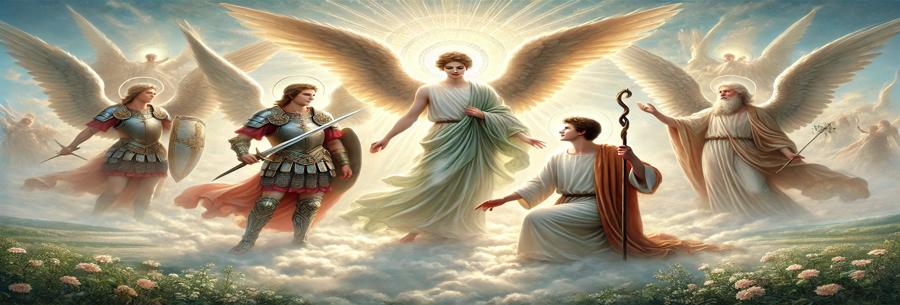The Feast of the Holy Guardian Angels, celebrated each year on 2 October, is a day dedicated to the recognition of guardian angels in Christian tradition. These angels, sent by God to protect, guide and inspire every person throughout their lives, occupy an essential place in Christian theology. Their feast day is an opportunity for the faithful to thank these spiritual beings for their benevolent protection and constant support in everyday life.
Origins and Theology of Guardian Angels
Guardian angels are a belief deeply rooted in the Judeo-Christian tradition. The idea that every person has a personal guardian angel comes from various passages of Scripture, which refer to these celestial beings as divine protectors and messengers. One of the most often quoted verses is from the Book of Psalms (91:11-12):
"For he will command his angels to guard you in all your ways; they will carry you in their hands, lest your foot strike against a stone."
This passage, like others in the Old and New Testaments, suggests that angels have a mission of protection and guidance given directly by God.
In the New Testament, Jesus himself refers to guardian angels. In the Gospel of Matthew (18:10), Jesus says:
"Beware of despising any of these little ones, for I tell you that their angels in heaven continually behold the face of my Father who is in heaven."
This verse has been understood as confirmation that children, but also adults, have guardian angels who watch over them and are in direct communication with God.
Development of the Cult of Guardian Angels
Devotion to guardian angels has developed over the centuries. From the earliest days of the Church, Church Fathers such as Saint Basil and Saint Jerome taught that every Christian is assisted by a personal guardian angel. Saint Jerome, translator of the Bible into Latin, asserted that these angels were given to each individual from birth to protect and guide them.
The cult of guardian angels took on particular importance during the Middle Ages, when the theology of angels (angelology) was a highly developed field of thought. Saint Thomas Aquinas, the great theologian of the 13th century, played a key role in formalising the doctrine of guardian angels. In his famous Summa Theologica, he explains that each guardian angel is an individual spiritual being created by God and charged with watching over a particular soul throughout its life.
It was not until the early 17th century that the Feast of the Guardian Angels was officially recognised. In 1608, Pope Paul V instituted this feast for the universal Church, setting the date for 2 October. The purpose of this feast was to remind Christians of the constant and benevolent presence of their guardian angels and to encourage them to pray for their protection and guidance.
The Role of Guardian Angels
In Christian tradition, guardian angels have several essential roles, which can be summarised by three main missions:
Protection: Guardian angels are first and foremost protectors. Their mission is to watch over the souls entrusted to them and protect them from physical and spiritual dangers. They are there to defend individuals against temptation and the attacks of evil, and to support them in moments of weakness.
Guidance : As well as protecting, guardian angels play a guiding role. They enlighten consciences, guide towards goodness and virtue, and help to discern God's will in everyday decisions. They are often invoked in prayers to obtain their help in complex situations or to ask for their advice before making an important decision.
Intercession: Guardian angels are also intermediaries between the soul and God. They pray for those they protect, interceding with the Lord to obtain graces, blessings or forgiveness. Their role as intercessors is particularly important in Christian prayer, as they are seen as always being in the presence of God.
The Feast of the Guardian Angels in the Liturgy
The Feast of the Guardian Angels is a special moment in the liturgy of the Catholic Church to remind the faithful of God's love and care manifested through his heavenly messengers. On this day, the Mass and prayers focus on expressing gratitude to the guardian angels and asking for their continued assistance.
The Roman Missal offers a special prayer for the Feast of the Guardian Angels, praising God for his attentive care through these protective spirits and asking that they continue to guide and protect the faithful. Many parishes also organise processions or special prayer times to thank the guardian angels for their role in the lives of Christians.
One of the most popular prayers dedicated to the guardian angels is the Guardian Angel prayer, taught to children and often recited daily by the faithful:
"Angel of God, my dear guardian, to whom God's love has entrusted me, be always at my side to enlighten and protect, govern and guide. Amen."
This simple prayer expresses deep trust in the guardian angel's benevolence and vigilance, and reminds Christians that they are never alone in their daily struggles.
Spiritual Significance of the Feast
The Feast of the Guardian Angels is a celebration of great spiritual richness, as it reminds believers that God never leaves them alone. Guardian angels symbolise God's constant solicitude for every human being, manifesting His providence and desire to protect each of His children.
The feast is also a call to prayer and vigilance. By recognising the existence and role of guardian angels, Christians are invited to become aware of the spiritual reality that surrounds them and to turn to their guardian angel to ask for protection, guidance and intercession.
Beyond the protective aspect, the feast of guardian angels is an invitation to reflect on the moral dimension of Christian life. Guardian angels encourage the faithful to choose the good, avoid the pitfalls of evil, and live in accordance with God's commandments. Their silent but constant presence is a reminder that every thought, every action, every decision has a spiritual dimension.
Conclusion
The Feast of the Holy Guardian Angels, celebrated on 2 October, is a day of gratitude and reflection on how God watches over every soul through his angels. It is an invitation for Christians to entrust themselves to their guardian angel, to strengthen their prayer life and to recognise the invisible but powerful presence of these celestial beings. Through this celebration, the Church reminds the faithful that, even in the most difficult times, they are never alone: an angel sent by God walks beside them, guiding them on the path to salvation.




















